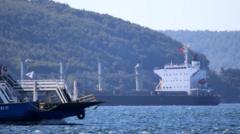BBC correspondent Mark Lowen shares his experience of being detained and deported from Turkey after covering protests against the government, raising concerns about press freedom and the rising authoritarianism in the country.
BBC Reporter Mark Lowen's Abrupt Deportation from Turkey Amid Protests

BBC Reporter Mark Lowen's Abrupt Deportation from Turkey Amid Protests
Mark Lowen recounts his surprising deportation from Turkey while covering significant anti-government protests, highlighting issues of media freedom in the country.
Mark Lowen, the BBC correspondent, recently experienced an unexpected twist during his return to Turkey, where he had previously resided. Having just informed his family of his joy at being back, the grim reality set in when the hotel receptionist summoned him to discuss an "urgent matter." Upon arrival, Lowen was confronted by three plain-clothes policemen who demanded his passport and led him away, attempting to shield the incident from media cameras.
Lowen had been in Istanbul for only three days to cover the anti-government protests triggered by the arrest of Mayor Ekrem Imamoglu, a prominent political rival to President Recep Tayyip Erdogan. Initially held at police headquarters, he found the atmosphere relatively agreeable, with some officers expressing their disagreement with the government's decision to detain him. However, a stark change in tone occurred once he was transferred to the foreigners' custody unit, where he was fingerprinted and denied further contact with the outside world.
The reason for his deportation was cited as being a "threat to public order," with the police providing limited explanations rooted in a vague government decision. Despite an officer's attempt to persuade Lowen to state he was leaving voluntarily on camera—potentially to shape a government-friendly narrative—he declined, recognizing the broader implications of such an admission.
Ultimately, he was held in a makeshift detention room at the airport until he was escorted onto a flight back to London. The Turkish government's grounds for his deportation, which later referenced a lack of proper accreditation, were not mentioned during his time in confinement, suggesting that they were retroactively constructed as a justification.
Throughout the ordeal, Lowen noted the crucial support from BBC management and the British Consulate, acknowledging that many prisoners, particularly journalists in Turkey, lack such safety nets. Since returning to Turkey in light of the recent protests, he recognized the increasing clampdown on media as a reflection of the country’s worsening press freedom record, where Turkey ranks 158th out of 180 countries in the Press Freedom Index, according to Reporters Without Borders.
As protests calling for democracy swell around the country, the Erdogan government dismisses them as "street terrorism," emboldened by its geopolitical alliances and a perceived lack of international consequence. The ongoing situation raises questions about the ability of activists and opposition to maintain their momentum against a leader entrenched in power for two decades.


















